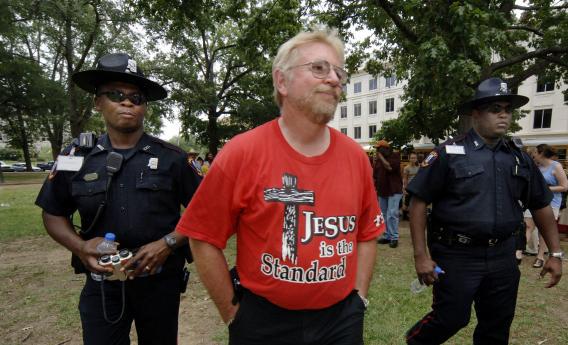Today marks the 40th anniversary of Roe v. Wade, and thus 40 years of an angry, hyper-religious, sex-phobic movement that has sought every avenue it can to turn back the clock, and return abortion to the black market. Anti-choice efforts have been successful in reducing access to safe, legal abortion, but for the past 40 years, pro-choice forces have maintained at least one clinic in every state in the country.
That might not last. Now various red states compete to see which can be the first to end legal abortion within their borders. As we take stock of where things stand in 2013, here are the three states likeliest to reach that goal in the near future.
Alabama. Alabama already has some of the most restrictive abortion rights in the country, which have been used to hound one of the last remaining clinics (the site of Eric Rudolph’s bombing in 1998) out of business, leaving the city of Birmingham with one clinic. To make things worse, the Alabama Supreme Court recently declared fetuses to be “children” under state law, giving those who believe embryonic personhood is the key to ending legal abortion a foothold. The decision explicitly made an exception for abortion, but anti-choicers hope that by routinely prosecuting pregnant women for “child abuse” or possibly even holding women criminally responsible for miscarriages, the groundwork can be laid for a legal decision banning abortion completely.
South Dakota. Voters in South Dakota have rejected bans on abortion twice in recent years, but conservative legislators will not be swayed by the public will as they try to chase off the last remaining clinic in the state. A law requiring abortion patients to wait 72 hours and endure a lecture at an anti-choice “crisis pregnancy center” before getting an abortion has been tied up in court, but in December, Planned Parenthood dropped its challenge to the 72-hour waiting period. (They are still contesting the mandatory shaming session that the law requires.) Getting full-time doctors to provide abortions under these circumstances is nearly impossible; the doctor who currently performs abortions at the state’s sole facility, in Sioux Falls, travels in from elsewhere to do so. If that doctor stops being able to travel so much, legal abortion may end in South Dakota.
Mississippi. In 2011, Mississippi voters rejected a ballot initiative aimed at banning abortion by giving fertilized eggs “personhood”—as in, the same rights as a living person. As with South Dakota, legislators have blown past the public’s expressed will to concoct a scheme to close Jackson Women’s Health Organization, the last remaining clinic in the state. They passed a law requiring abortion doctors to have admitting privileges at a local hospital, even though there is no medically necessary reason for such a restriction. To no one’s great surprise, the clinic’s doctors were unable to get these privileges, due in no small part to the area hospitals’ reluctance to draw negative attention from anti-choice militants. A judge placed an injunction on the law, but it was lifted this month, and state inspectors have already visited the clinic, which expects to receive a letter ordering it to shut down, which will no doubt kick off another round of legal actions. Options are running out for Jackson Women’s Health Organization, and for the people of Mississippi.
It’s difficult to predict what will happen to the women served by these threatened clinics if they disappear. For people with the means to travel—such as the legislators who pass these laws and their family members—it’s can be just a matter of going to a state with easier access and more liberal abortion laws to get the procedure. For women living in poverty, however, the options are often either illegal, unsafe abortions (often procured through the Internet) or being forced to give birth against their will. And despite anti-choice reassurances that it will all work out in the end, the research shows that women who want abortions and can’t get them often find that their worst fears come true.
